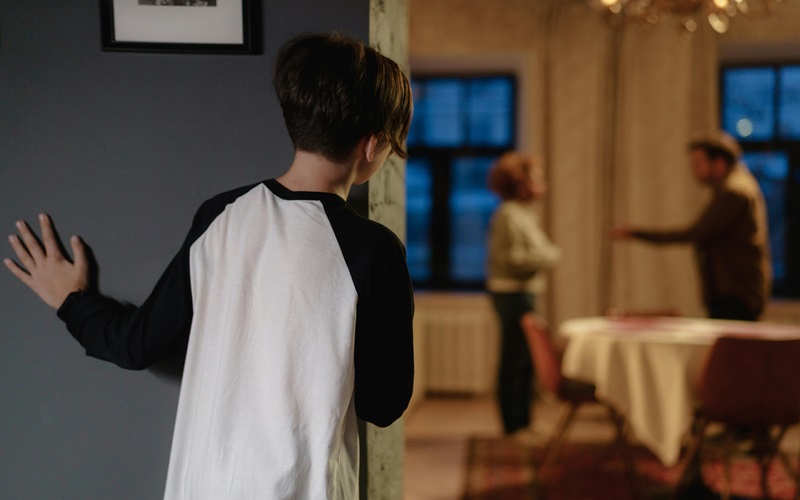The Weight of a Name
Mira always hated Sunday dinners. They were loud, exhausting affairs where the weight of unspoken words pressed down on her shoulders heavier than the steam rising from bowls of biryani. Her father sat at the head of the table, eyes sharp and voice sharper. Her mother hovered silently, refilling plates, pouring water, her face a mask of weary compliance. Mira’s younger brother Kabir—the golden child—laughed a little too loudly at their father’s jokes, eager to stay in his good graces.
Mira, on the other hand, had long stopped trying to win approval. At twenty-nine, she felt suffocated under the invisible contract of duty and gratitude.
“Why are you always so quiet, Mira?” her father asked that evening, a thick slice of lamb speared on his fork.
She hesitated, picking at her rice. “I just don’t have much to say tonight.”
Her father’s laugh was low and humourless. “You young people these days. So full of attitude. You think you know better than the people who raised you, who sacrificed everything for you.”
Her mother winced but said nothing. Kabir’s eyes flicked downward, pretending fascination with his plate. Mira felt something flicker in her chest—an ember, a faint rebellion—but she extinguished it with a breath.
After dinner, Mira helped her mother with the dishes. The kitchen was a small world of clinking plates and running water. Her mother worked quietly, shoulders curved inward as if shielding herself from some unseen blow.
“Why didn’t you say anything?” Mira whispered, her voice barely louder than the hum of the fridge.
Her mother sighed. “It’s just how he is, Mira. You know that. He doesn’t mean to hurt you.”
But he did mean it, Mira thought. Every word, every cutting comment, every way he twisted their love into something transactional—it was all deliberate.
That night, Mira lay in bed staring at the ceiling, her father’s words looping in her head: “You owe us everything.”
She had heard it all her life. When she chose literature over law. When she wanted to move to another city for a job. When she stayed silent rather than fight back.
She closed her eyes and tried to remember a time when love from her father had felt warm and unconditional. But all she could recall was the weight of obligation, the fear of disappointing him, the bitter taste of guilt for wanting more—for wanting freedom.
Family is often described as the cornerstone of love and belonging. It is the haven where life begins, the sanctuary where one returns after every storm. Yet, what happens when that sanctuary becomes a labyrinth, where love is laden with expectation and care becomes indistinguishable from control?
Oppression within a family is not always loud or visible. It does not wear the face of hatred or malice. Instead, it often emerges quietly, wrapped in the language of love, tradition, and responsibility. It is the paradox of feeling both cherished and suffocated, of being nurtured while slowly losing oneself.
What does it mean when those who are meant to protect your freedom instead become the architects of its boundaries? And what does it cost to question the ties that bind us to them?
Love and Its Shadows
To speak of family oppression is to enter a shadowed terrain, where love and control often intertwine. It is rarely the kind of oppression we associate with cruelty or malice. Instead, it is subtle, almost imperceptible—a slow and quiet bending of one’s spirit to fit a mold shaped by another’s fears, hopes, or expectations.
A parent may insist, “We just want what’s best for you,” yet their idea of “best” leaves no room for your dreams. A sibling’s care might manifest as overprotection, their love constraining your choices in the name of keeping you safe. These acts rarely come from ill intent. More often, they arise from a love so deeply intertwined with fear that it cannot let go.
This is not the absence of love; it is love with conditions. And conditions, no matter how well-meaning, have a way of eroding the soul.
The Invisible Cage
The unique pain of family oppression lies in its invisibility. It is not a cage made of iron but of intangible expectations and obligations. There are no walls, and yet, you feel you cannot leave.
The cage is built slowly, over years. A father’s disapproving glance when you express a desire that doesn’t align with his plans. A mother’s quiet reminder of the sacrifices made for your sake. The collective silence that descends when you voice a thought that disrupts the family narrative.
These moments accumulate like sediment, shaping a life where every choice feels weighted with invisible strings. You learn to shrink your dreams to avoid conflict, to soften your truths to preserve peace. The cage, though unseen, is unrelenting.
The Cost of Belonging
Family teaches us that belonging is sacred, but in oppressive dynamics, belonging often comes at a cost. To stay within the fold, you may be asked—explicitly or implicitly—to silence parts of yourself.
A child may learn that questioning tradition brings not discussion but disappointment. A young adult may discover that pursuing independence invites accusations of selfishness. Over time, the oppressed internalize these lessons, mistaking compliance for love and erasure for harmony.
But what kind of belonging requires the abandonment of self? What kind of love insists on silence in the face of suffering?
The Fragility Beneath Control
In many families, oppression is not born of malice but of fragility. The oppressor is often not a tyrant but someone deeply fearful—of losing their role, their relevance, or their sense of purpose.
A parent who clings tightly to their child’s choices may do so because they fear what freedom signifies: their own perceived inadequacy or the loss of control they equate with love. A sibling who resents your independence might be grappling with their own unfulfilled desires.
This fragility does not absolve the harm but reframes it. The oppressor, too, is a product of the same cycles they perpetuate. To see this is not to excuse their behaviour but to understand the depth of the patterns at play.
The Longing for Freedom
For the oppressed, the longing for freedom is often accompanied by profound guilt. To set boundaries feels like betrayal. To walk away feels like abandonment.
This is the cruel irony of family oppression: the very act of reclaiming oneself can feel like the ultimate disloyalty. Yet, freedom is not the rejection of love but its rediscovery. It is the recognition that love cannot thrive where fear resides, that care cannot coexist with control.
Freedom, in this context, is not about severing ties but about reshaping them. It is the courage to say, “I love you, but I cannot lose myself to you.”
Healing
To heal from family oppression is to undertake a journey as painful as it is liberating. It begins with questioning the narratives you were taught:
“Am I selfish for wanting more?”
“Do I owe my silence to preserve their comfort?”
“Is love meant to feel this heavy?”
Healing does not always mean confrontation. Sometimes, it means setting quiet, firm boundaries. Other times, it means seeking distance—not as an act of rejection but as an act of self-preservation.
It is a slow process, filled with moments of doubt and grief. You grieve not only for the family you had but for the family you hoped they could be. But with each step, the weight begins to lift.
The Other Side of Freedom
Freedom from family oppression does not mean abandoning love. It means redefining it. It means choosing relationships that honor your voice, your choices, your individuality.
Family is not an unchanging bond but a dynamic connection. When love is unconditional, it does not fear change. It adapts, grows, and allows space for both closeness and distance.
And for those who cannot offer this kind of love, freedom means learning to hold them with compassion—from a distance, if necessary. It is the quiet act of forgiving without inviting harm, of loving without losing yourself.
In the end, freedom is not about walking away from family. It is about walking toward yourself. And in doing so, you carry forward a love that is no longer bound by fear, guilt, or expectation—a love that is finally free.




